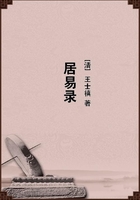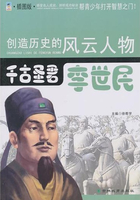Meanwhile Phrynichus, the Athenian commander, had received precise intelligence of the fleet from Leros, and when his colleagues expressed a wish to keep the sea and fight it out, flatly refused either to stay himself or to let them or any one else do so if he could help it. Where they could hereafter contend, after full and undisturbed preparation, with an exact knowledge of the number of the enemy's fleet and of the force which they could oppose to him, he would never allow the reproach of disgrace to drive him into a risk that was unreasonable. It was no disgrace for an Athenian fleet to retreat when it suited them: put it as they would, it would be more disgraceful to be beaten, and to expose the city not only to disgrace, but to the most serious danger. After its late misfortunes it could hardly be justified in voluntarily taking the offensive even with the strongest force, except in a case of absolute necessity: much less then without compulsion could it rush upon peril of its own seeking.
He told them to take up their wounded as quickly as they could and the troops and stores which they had brought with them, and leaving behind what they had taken from the enemy's country, in order to lighten the ships, to sail off to Samos, and there concentrating all their ships to attack as opportunity served. As he spoke so he acted; and thus not now more than afterwards, nor in this alone but in all that he had to do with, did Phrynichus show himself a man of sense. In this way that very evening the Athenians broke up from before Miletus, leaving their victory unfinished, and the Argives, mortified at their disaster, promptly sailed off home from Samos.
As soon as it was morning the Peloponnesians weighed from Teichiussa and put into Miletus after the departure of the Athenians; they stayed one day, and on the next took with them the Chian vessels originally chased into port with Chalcideus, and resolved to sail back for the tackle which they had put on shore at Teichiussa. Upon their arrival Tissaphernes came to them with his land forces and induced them to sail to Iasus, which was held by his enemy Amorges. Accordingly they suddenly attacked and took Iasus, whose inhabitants never imagined that the ships could be other than Athenian. The Syracusans distinguished themselves most in the action. Amorges, a bastard of Pissuthnes and a rebel from the King, was taken alive and handed over to Tissaphernes, to carry to the King, if he chose, according to his orders: Iasus was sacked by the army, who found a very great booty there, the place being wealthy from ancient date. The mercenaries serving with Amorges the Peloponnesians received and enrolled in their army without doing them any harm, since most of them came from Peloponnese, and handed over the town to Tissaphernes with all the captives, bond or free, at the stipulated price of one Doric stater a head; after which they returned to Miletus. Pedaritus, son of Leon, who had been sent by the Lacedaemonians to take the command at Chios, they dispatched by land as far as Erythrae with the mercenaries taken from Amorges; appointing Philip to remain as governor of Miletus.
Summer was now over. The winter following, Tissaphernes put Iasus in a state of defence, and passing on to Miletus distributed a month's pay to all the ships as he had promised at Lacedaemon, at the rate of an Attic drachma a day for each man. In future, however, he was resolved not to give more than three obols, until he had consulted the King; when if the King should so order he would give, he said, the full drachma. However, upon the protest of the Syracusan general Hermocrates (for as Therimenes was not admiral, but only accompanied them in order to hand over the ships to Astyochus, he made little difficulty about the pay), it was agreed that the amount of five ships' pay should be given over and above the three obols a day for each man; Tissaphernes paying thirty talents a month for fifty-five ships, and to the rest, for as many ships as they had beyond that number, at the same rate.
The same winter the Athenians in Samos, having been joined by thirty-five more vessels from home under Charminus, Strombichides, and Euctemon, called in their squadron at Chios and all the rest, intending to blockade Miletus with their navy, and to send a fleet and an army against Chios; drawing lots for the respective services.
This intention they carried into effect; Strombichides, Onamacles, and Euctemon sailing against Chios, which fell to their lot, with thirty ships and a part of the thousand heavy infantry, who had been to Miletus, in transports; while the rest remained masters of the sea with seventy-four ships at Samos, and advanced upon Miletus.
Meanwhile Astyochus, whom we left at Chios collecting the hostages required in consequence of the conspiracy, stopped upon learning that the fleet with Therimenes had arrived, and that the affairs of the league were in a more flourishing condition, and putting out to sea with ten Peloponnesian and as many Chian vessels, after a futile attack upon Pteleum, coasted on to Clazomenae, and ordered the Athenian party to remove inland to Daphnus, and to join the Peloponnesians, an order in which also joined Tamos the king's lieutenant in Ionia. This order being disregarded, Astyochus made an attack upon the town, which was unwalled, and having failed to take it was himself carried off by a strong gale to Phocaea and Cuma, while the rest of the ships put in at the islands adjacent to Clazomenae- Marathussa, Pele, and Drymussa. Here they were detained eight days by the winds, and, plundering and consuming all the property of the Clazomenians there deposited, put the rest on shipboard and sailed off to Phocaea and Cuma to join Astyochus.















